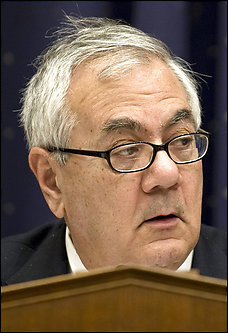Delays in Bank Aid Spur Frustration
As Requests Pile Up, Executives Leery Of Treasury's Silence on Bailout Decisions
Friday, January 23, 2009
A massive backlog of bank applications for emergency federal aid has provoked widespread frustration over how the Treasury Department is allocating rescue funds and raised suspicions among executives that political connections are playing a role, industry officials and regulators say.
The delay is pushing bank executives across the nation to lobby their lawmakers, financial groups and friends within the federal government to try to expedite their requests.
"I think there is a suspicion among a large number of our members that it's who you know rather than the merits of the application," said Camden Fine, chief executive of the Independent Community Bankers of America. "I don't know that to be a fact, but I know there is a strong undercurrent of suspicion among my members that you have to have some sort of connection before you get the golden touch or the blessing from Treasury to get money."
Since the Treasury announced the program in October to inject federal aid into banks in exchange for equity stakes, about 350 banks have received the money, a fraction of the 1,600 institutions that have asked, according to regulators.
Treasury officials have been secretive about why certain banks received the money first, citing the need to protect sensitive market information. But lawmakers and industry officials have widely criticized their decisions as opaque and inconsistent.
Those with easiest access to the initiative, known as the Capital Purchase Program, include the largest Wall Street firms that many community bankers blame for dragging down the entire financial system.
Community bank executives and industry officials said that while Bank of America and Citigroup executives are able to dial up senior officials at the Treasury and the Federal Reserve and quickly receive tens of billions of dollars in federal aid, the heads of midsize and smaller institutions must wait months.
"What I do have a HUGE problem with is the double standard that my government is using," Tom Mork, chief executive of Lakeview Bank in Lakeville, Minn., wrote in a letter to financial associations and the congressional delegation from his state. The "public has no clue about what is happening behind the scenes. My hunch is that if they understood that their local bank declined their loan request because the capital they require to continue growing is being unfairly distributed to the very institutions that caused this mess, they too would be outraged."
Mork added that the Treasury required his bank to raise matching capital from the private sector in order for his application for $1.5 million in federal funds to be approved.
But community banks' access to the federal funds is inconsistent with some firms, for instance Central Pacific Financial of Honolulu, finding little difficulty. In December, the Treasury approved the application of the ailing Hawaii bank for $135 million, without any such conditions. Contrary to the stated goals of the Capital Purchase Program, Central Pacific used most of the money to avoid censure by their regulators rather than lend to customers, bank officials said at the time.
The transition between presidential administrations has delayed matters. Former president George W. Bush's Treasury appointees left their posts when his administration ended Tuesday. No one was in the department's public relations office yesterday to field news media questions. Messages for Neel Kashkari -- a Bush holdover who agreed to oversee the Capital Purchase Program and other initiatives within the $700 billion Troubled Assets Relief Program until Obama's officials take over -- were not returned.
Meanwhile Senate confirmation of Timothy F. Geithner, Obama's pick for Treasury secretary, has been put off until Monday, leaving his staff unable to take up their posts in the department.



